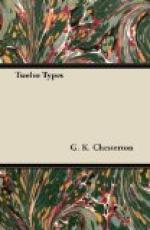It is this potentiality for enthusiasm among the mass
of men that makes the function of comedy at once common
and sublime. Shakespeare’s ’Much Ado
about Nothing’ is a great comedy, because behind
it is the whole pressure of that love of love which
is the youth of the world, which is common to all
the young, especially to those who swear they will
die bachelors and old maids. ‘Love’s
Labour Lost’ is filled with the same energy,
and there it falls even more definitely into the scope
of our subject since it is a comedy in rhyme in which
all men speak lyrically as naturally as the birds
sing in pairing time. What the love of love is
to the Shakespearian comedies, that other and more
mysterious human passion, the love of death, is to
‘L’Aiglon.’ Whether we shall
ever have in England a new tradition of poetic comedy
it is difficult at present to say, but we shall assuredly
never have it until we realise that comedy is built
upon everlasting foundations in the nature of things,
that it is not a thing too light to capture, but too
deep to plumb. Monsieur Rostand, in his description
of the Battle of Wagram, does not shrink from bringing
about the Duke’s ears the frightful voices of
actual battle, of men torn by crows, and suffocated
with blood, but when the Duke, terrified at these
dreadful appeals, asks them for their final word,
they all cry together ‘Vive l’Empereur!’
Monsieur Rostand, perhaps, did not know that he was
writing an allegory. To me that field of Wagram
is the field of the modern war of literature.
We hear nothing but the voices of pain; the whole
is one phonograph of horror. It is right that
we should hear these things, it is right that not one
of them should be silenced; but these cries of distress
are not in life as they are in modern art the only
voices, they are the voices of men, but not the voice
of man. When questioned finally and seriously
as to their conception of their destiny, men have
from the beginning of time answered in a thousand
philosophies and religions with a single voice and
in a sense most sacred and tremendous, ‘Vive
l’Empereur.’
CHARLES II
There are a great many bonds which still connect us
with Charles II., one of the idlest men of one of
the idlest epochs. Among other things Charles
II. represented one thing which is very rare and very
satisfying; he was a real and consistent sceptic.
Scepticism both in its advantages and disadvantages
is greatly misunderstood in our time. There is
a curious idea abroad that scepticism has some connection
with such theories as materialism and atheism and
secularism. This is of course a mistake; the
true sceptic has nothing to do with these theories
simply because they are theories. The true sceptic
is as much a spiritualist as he is a materialist.
He thinks that the savage dancing round an African
idol stands quite as good a chance of being right as
Darwin. He thinks that mysticism is every bit
as rational as rationalism. He has indeed the
most profound doubts as to whether St Matthew wrote
his own gospel. But he has quite equally profound
doubts as to whether the tree he is looking at is
a tree and not a rhinoceros.




